INFPs, ISFPs and Empathic Mirroring
A lot of articles talk about Fe users (FJ types) and how they use empathy, but there are far less articles that talk about the empathy of Fi-dominant types (the IFPs). IFPs are known for their empathy and compassion, but it tends to show itself in a way that’s a little different from the way FJs show empathy.
Not sure what your personality type is? Take our new personality questionnaire here. Or you can take the official MBTI® here.
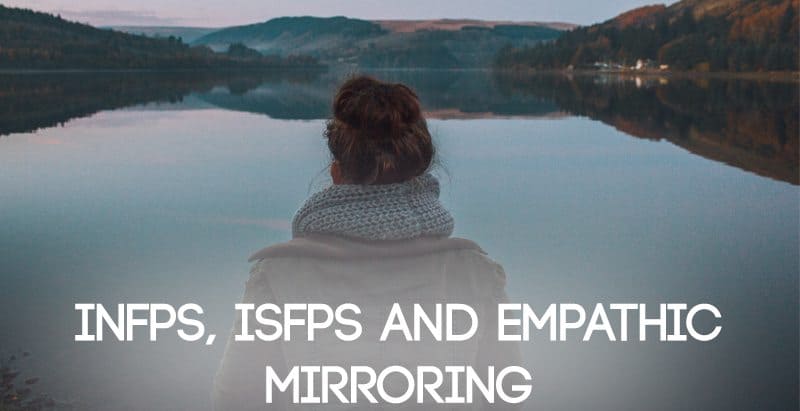
What is Introverted Feeling?
IFPs have dominant introverted feeling (Fi) in their function stack. Introverted Feeling is all about exploring and refining personal values, feelings, and tastes. Fi-users have a strong sense of individuality and uniqueness and don’t mind marching to the beat of their own drum. If you’re an ISFP or an INFP, you’re on a constant quest for personal meaning, significance, and understanding. Having inner harmony and the sense that you’re doing what’s right drives you.
Typologist and psychologist Dr. A.J. Drenth says, “Rather than surveying and distributing feelings across a breadth of individuals (as Fe does), Fi focuses largely on one’s own feelings and sentiments…While FPs may invest in the well-being of select individuals (e.g., their children), Fi is not authentically concerned with, nor does it feel responsible for, the overall feeling tenor of groups…FPs empathize with, and form attachments to, things that move or personally affect them.”
It’s important to note that Introverted Feeling is NOT a selfish function. Some people read that it is focused on its own feelings and therefore assume that Fi is self-absorbed or self-involved. Instead, Fi-users constantly evaluate what’s happening around them and determine where it aligns with their own emotions and values. Do things meld with what they believe and feel? Does this emotionally feel “right” to them? Fi users also invest deeply into the emotional well-being of their loved ones, friends, or groups they feel connected with. Many IFPs are champions of the underdogs and stand up for people they feel are discriminated against or marginalized.
Signs That You’re an Introverted Feeling Type:
- You have a driving need to be authentic
- You look inwards to decide what feels “right”
- You care less about societal expectations and more about what your heart is telling you
- You don’t mind being different
- You stand up for what you believe in, even if it ruffles feathers
- You listen to people, trying to understand their unique values
- You feel that everyone is entitled to their very specific set of values and emotions
- You hate the idea of making anyone be something they’re not
- You detest labels and being labeled
- You process your feelings best when you can be alone and away from stimulation
- You don’t need to use other people as a sounding board to understand your own feelings
- You care deeply about doing what you feel is ethically right
- You have a heart for the underdogs and champion causes that matter to you
Fi is about being authentic and true to one’s self, even in the face of outward pressures or societal expectations. It’s not about being selfish, although it may look like that to people who want the Fi type to “blend” with others rather than be true to themselves.
Introverted Feeling and “Mirroring”
IFPs mirror other people’s emotions, reflecting them against their own inner database of history and experience. This mirroring can happen in a hyper-fast way so that it almost feels like the IFP is instantly absorbing the emotions of others. As IFPs mature and grow, mirroring tends to happen faster and faster and with more and more skill and accuracy. As a result, they can easily take another person’s perspective and try to grasp how it would feel to be that person. They often think, “What would it be like if that were me?”
Introverted Feeling keeps a vast storehouse of emotional history inside one’s mind. The way things feel or have felt in the past is deeply ingrained, with nuance, richness, and detail. When someone else is describing an experience to them, IFPs can almost instantaneously find a mirror experience or emotion in their own history to draw from in order to relate.
The IFP Mirroring Experience:
- Someone conveys a feeling to the IFP
- The IFP immediately scans their database of thousands of emotional memories, finding the nearest one (this process may happen immediately, nearly unconsciously)
- The IFP then identifies how the other person might feel by registering it against their own emotional history map
In early life, IFPs will have to spend a little more time and effort mirroring others because their experiences are still more limited at a young age. But as their life evolves and their experiences broaden they become more and more fluent at understanding the emotions of others. This results in them very quickly being able to identify where others are coming from as if they are experiencing it themselves. This is one reason why IFPs are often skilled in the dramatic arts. They usually have no trouble imagining and empathizing with the emotions of people from many diverse walks of life.
Not sure what your personality type is? Take our new personality questionnaire here. Or you can take the official MBTI® here.
“The thing I get out of acting is … inhabiting the world of the role. … If I can keep losing myself – and finding parts of myself … then that’s all I can really ask for.”
– Andrew Garfield, an INFP
Introverted Feeling and Open-Mindedness
IFPs are known for being open-minded and receptive to others. Because they’re automatically judging people against external standards, they are open to hearing out anyone’s situation or plight with understanding. Many people take advantage of the IFPs open-mindedness and use them as a “dumping ground” for their emotional baggage. Because the IFP wants so much to understand the plight of their loved ones, this can leave them feeling drained. On the other hand, in a healthy relationship, the IFP can open the eyes of their friends and loved ones to new perspectives and self-actualization that can result in healing and immense self-improvement.
For IFPs, listening and understanding another person is more important than “relating.” Each individual has their own experience, and the Introverted Feeling type wants to respect that and give it space rather than making it about them.
“We pity in others only those evils which we ourselves have experienced.”
– Jean-Jacques Rosseau, an ISFP
Introverted feeling types focus intensely on a specific group of people or causes, rather than spreading their energy far and wide. Introverted functions have a smaller breadth but a deeper focus, whereas extraverted functions have a wider breadth but a more shallow focus. Because of this, Fi users care intensely for a specific group of people, pulling all their energy into understanding and empathizing and helping them. I’ve known many ISFPs and INFPs who have devoted most of their lives to humanitarian efforts or volunteer their spare time to help out in animal shelters.
As I said before, IFPs are very focused on standing up for people, animals, or causes they feel are needing attention. They hate to see injustices of any kind, so they thrive on championing and speaking for small groups of people who need a voice. To people they don’t know very well IFPs can actually seem very cool or aloof. They don’t share their emotions readily unless a great amount of trust is gained. This is why sometimes I refer to Fi-doms as “feelers in disguise.” You have to prove your loyalty and trustworthiness before they’ll share their deeper emotions and values with you. Until then, they tend to be quiet, reserved, and observant.
The Beauty of Introverted Feeling
Introverted feeling types are driven to be as authentic as possible with people. This doesn’t mean oversharing every single thing that pops into their head, but it does mean when they do speak, they want it to be as honest as possible. And alongside this honesty is a deep urge to care for others. IFPs are gentle souls who rarely, if ever, will intentionally hurt another person’s feelings. They have an innate sense of compassion for people and an ability to see everyone as unique and capable of goodness. IFPs are known for their incredible listening skills, the ability to listen with their “whole brain” and shut out other distractions. In an IFP friend you will find someone who not only listens to you and respects you but who is also willing to give you tough words of wisdom and advice when it’s needed. Of course, most of the time they will do this in the gentlest way possible because they don’t like to force their views on other people and they are very aware of the power words have to hurt or offend.
“Freedom is the right to tell people what they do not want to hear.”
– George Orwell, an INFP
How IFPs Can Avoid Empathic Overwhelm
IFPs need to make sure they take time for self-care so that they don’t overload their senses with the emotional cares of others. It can be difficult for IFPs to separate themselves from the struggles and hardships of people or causes they care about. This can cause them to overwork and tire themselves to the point of exhaustion. It’s important for IFPs to make time to be alone, to recharge in their own space, and to get in touch with their own emotions without the demands of others weighing down on them.
Finding ways to be creative helps the IFP to avoid getting overwhelmed emotionally. They are deeply inspired by artwork, and can find relief by seeing their emotions in the arts of other people. This can be artistic expression in painting, music, film, or poetry. IFPs long to find solidarity and validation for their feelings. Many times they can feel a sense of peace and understanding if they can find some creative way to have their own emotions “mirrored” in a creative form.
IFPs also find relief from writing their emotions down and expressing them in a creative way. They love to read literature about people who stand up for their values, who fight for their beliefs, and who have that same strong sense of right and wrong that they hold within themselves.
Other ways for the IFP to avoid emotional overwhelm include getting in touch with their other cognitive functions. It’s important not to always rely on the dominant function and overuse it to the point of exhaustion. IFPs should look for inspiration through their auxiliary function, either intuition or sensing. They can do this by getting outside and exploring nature, reading books, or listening to music. These activities can also put them in touch with their sensing side.
What Do You Think?
Do you experience empathy overwhelm? Do you have any suggestions? Let me know in the comments!
Find out more about your personality type in our eBooks, Discovering You: Unlocking the Power of Personality Type, The INFJ – Understanding the Mystic, and The INFP – Understanding the Dreamer. You can also connect with me via Facebook, Instagram, or Twitter!
Other Articles You Might Enjoy:
10 Surprising Truths About INFPs
10 Surprising Truths About ISFPs


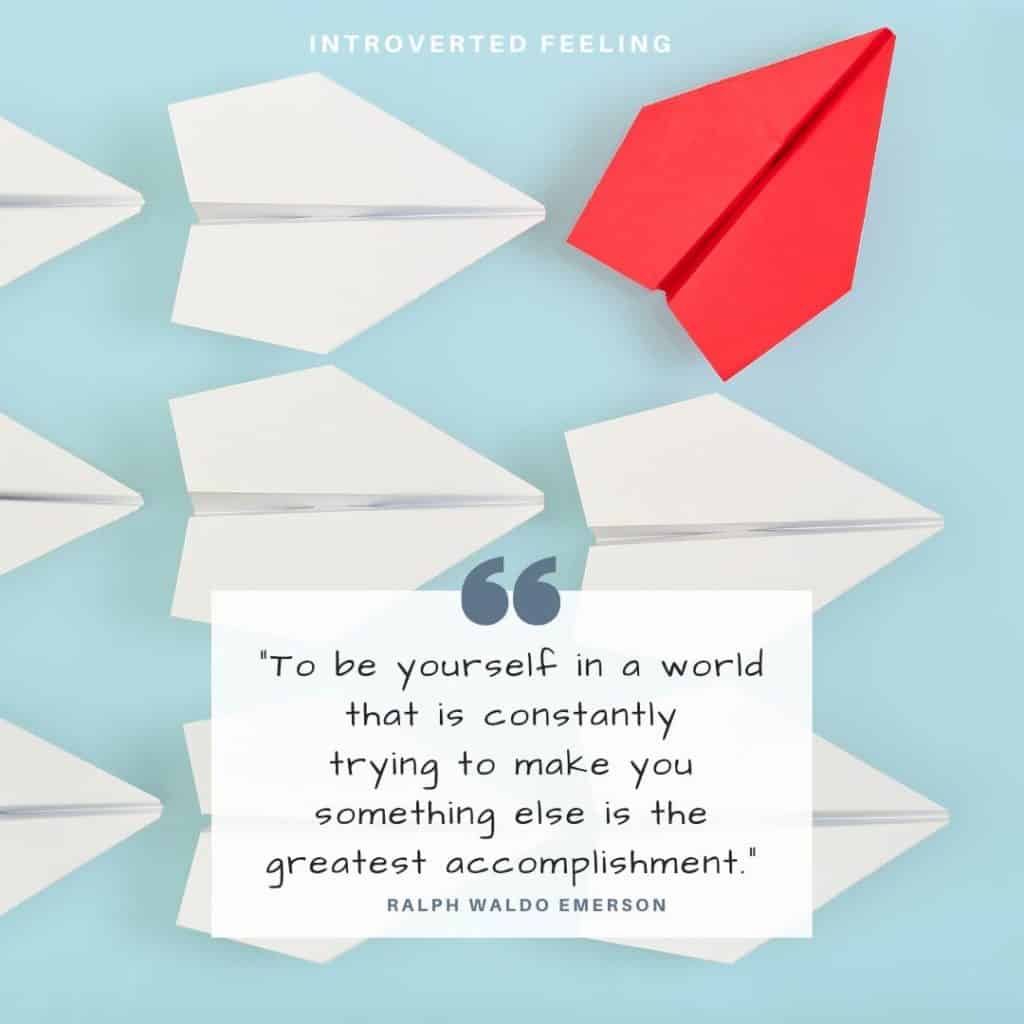


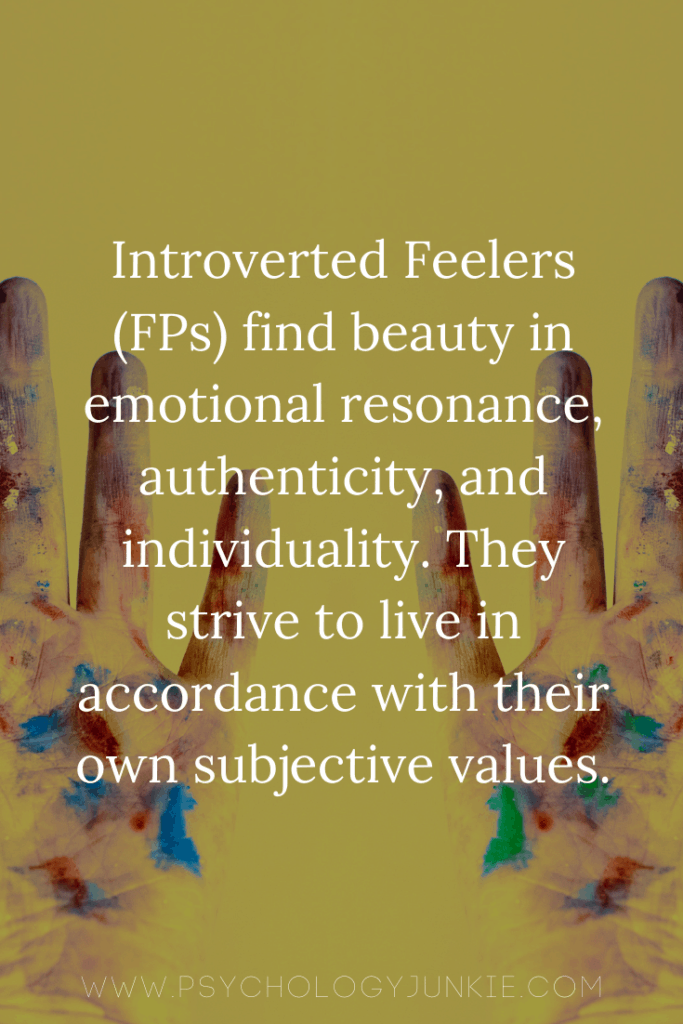

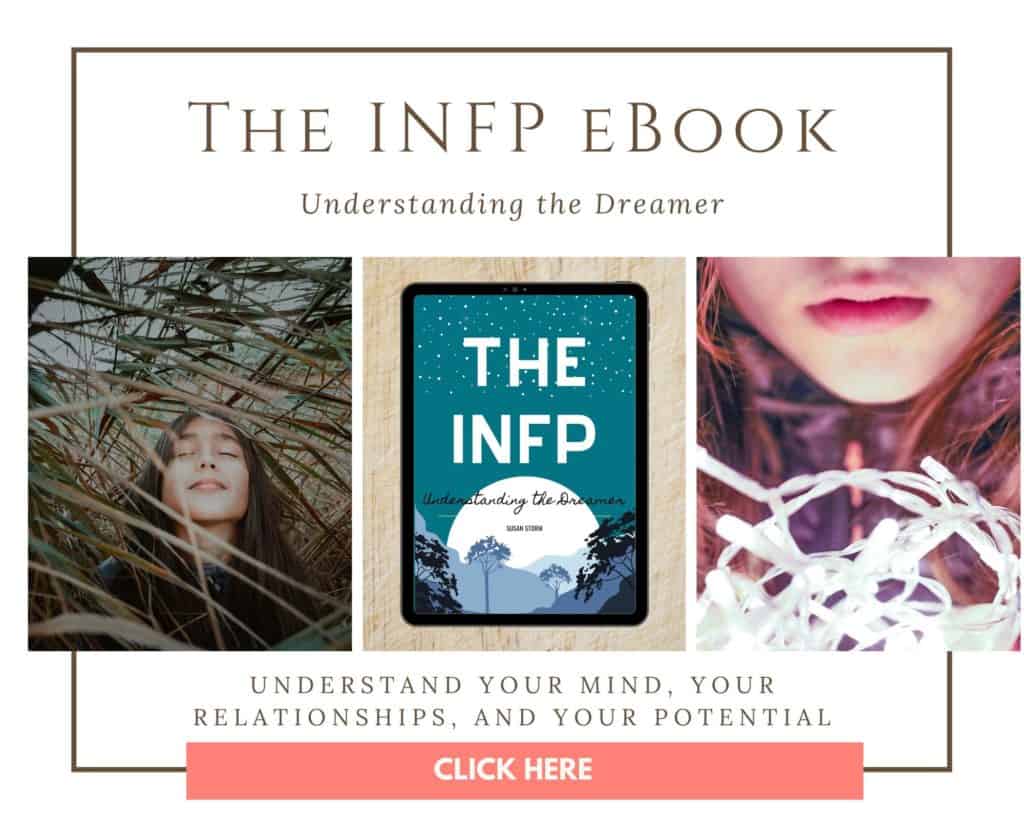





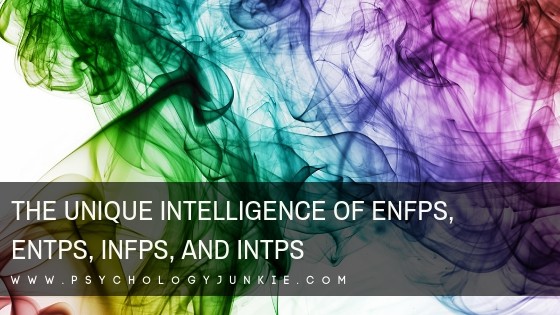

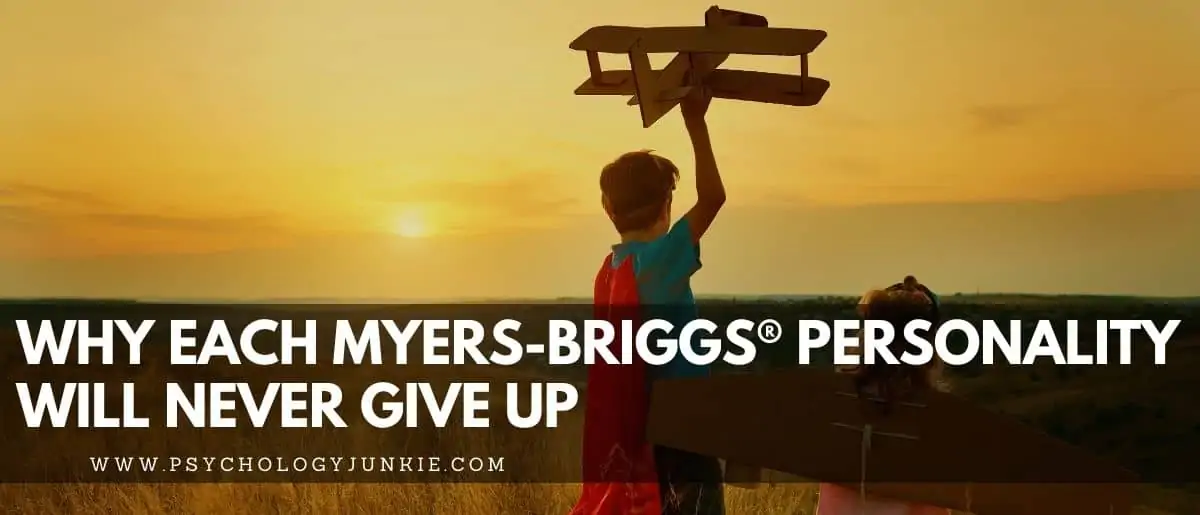

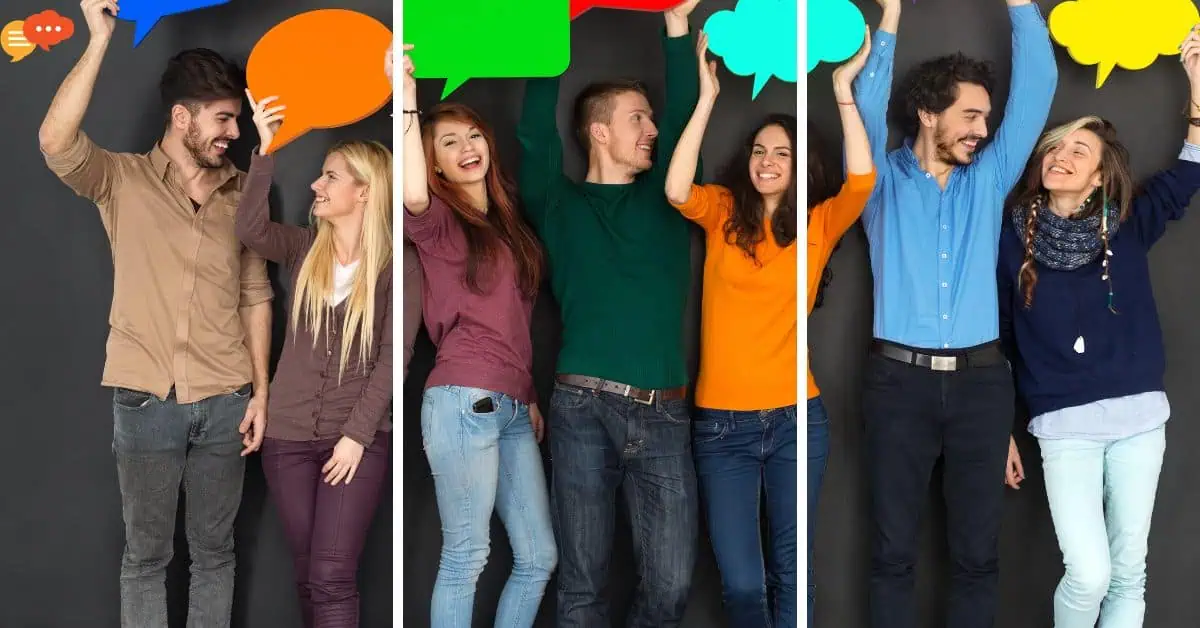
I don’t know if you do it consciously or not, but you really seem to try and make yourself (INFJ’s) seem “special.” It’s easy to see through. Everything you have said about INFJ’s is the pretty much the same for INFP’s.
I’m sorry that it comes across this way. I definitely do not think INFJs are more special than any other type at all. In fact, I keep re-writing this post so that (hopefully) nobody will sense a bias either way. It is very difficult to explain the difference between Fi and Fe and trying to do it justice is a daunting task. I also had to write this post with distractions and kids all around, which always makes it harder for me to know whether I’m doing a good job or not. Any suggestions of course are always appreciated.
I’d like to take this opportunity to insult you and leave unconstructive criticism.
Sincerely, a high Fi user who is the real special one.
P.S. I wanted to say more but have to cut this short because I need to go lookup petty in the dictionary.
I’d like to take this opportunity to insult you and leave unconstructive criticism.
Sincerely, a high Fi user who is the real special one.
P.S. I have plenty more say about this but need to cut it short so I can go lookup petty in the dictionary.
I thought you wrote this very well. If we know ourselves or others with these personality types, it’s easy to understand what your post is all about. I am ISFP and I do agree with these things. I care about people very much, except for those who come off brash or rude/condescending. I may change my viewpoint of them if I get to know them better or find out something from their past that was awful, or that they suffer from some type of emotional/mental distress or condition. People need second chances, and I will give them that. However if a person continuously acts like a butt I will write them off forever.
Thank you for this article. This helped me understand how I actually process people’s emotions. I have always wondered why, as a feeler, I do not readily feel/absorb other people’s emotions readily and that I have to work hard to feel what they’re feeling. That has caused me to feel guilty of being apathetic. Now it makes complete sense that it is more of a tendency to mirror rather than to absorb emotions. Thank you again. It was very helpful!
I actually think you did a great job differentiating Fi and Fe. I’m an auxiliary Fi user (ENFP) and I identified with a lot of this. It was actually really interesting to read as one of my best friends is an Fe dominant (ESFJ). She often says that we are similar in how we want to take care of others and so have a hard time expressing our own needs. I’ve known that there are subtle differences in our experience of this, but haven’t been able to explain it before. Great insight!
Thank you Susan, the previous post on NFJ burnout did have close similarities to what most NFP types would claim as well. Your explanation seems spot on to the extant that all NF’s have an amazing ability to sense another’s “vibe”, but an NFP is more likely to question their own intentions beforehand when deciding who/what to put their mind to. It’s not that we don’t get easily burned out (more common in INFP), just we see it coming sooner because of the constant checklist of values we hold so dear. Having a naturally high sense of self awareness does tend to hold me back from jumping on any bandwagon subjects, good or bad. But always willing to hear every side of the story!
Thank you Allegra! I definitely think that all NF types are likely to experience emotionally overwhelming times or empathy overload. I wanted to contrast the two different ways of experiencing it in two different posts, though, since the Fe way is different than the Fi way. I think it did make people feel that I was saying NFJs experienced more empathy than NFPs, which was not my intention at all. I simply think it is harder for them to differentiate other people’s emotions from their own so they’re going to experience a different type of burnout than an NFP would who is more aware of their own emotions and what is being let in or out. Hopefully that makes sense! Thanks so much for giving me some great feedback to think about. It’s always great to hear perspectives from various types to know if I’m on the right track or missing something 🙂
This post was a sort of aha moment for me. I’m an INFP and my mother is an INFJ. We are both deeply feeling people, but this explains the subtle, but in the case of a mother-daughter relationship, a very important difference that has often confounded me. She does seem to transmit and absorb feelings, and I understand and process them. Sometimes it is a relief to know this is the way we are made. It seems easier to have compassion for others (without absorbing negativity!) when we understand each other. Perhaps it is because of my personality type (haha), but I sensed no bias in this post. Thank you so much for taking the time to explain this!
As an INFP I don’t relate to the way people write about this mirroring process. From my perspective, there is no conscious putting myself in someone else’s shoes and imagining how they are feeling. I’m aware of how they are feeling in real time, and I’m aware of individuals across a room, not just people I’m speaking to. The way I would explain it is pattern recognition via Ne. My intuition picks up on global patterns in people’s body language, tone of voice etc (this is not something I can turn off – it’s always there) I cannot help but notice where people’s eyes move, when they pause, when they leave things unsaid,, when they are uncomfortable, when they lie because their body language is incongruent with their words etc. This is not a conscious detailed sensing like an INFJs Se perhaps, it’s more a noticing of all of these patterns in the environment simultaneously – the gaps between these various points are filled in via joining the dots and past experience (this is not a conscoius thinking though, it’s just an immediate real time knowing). I can only speak from my own perspective (I’m not sure all INFPs experience this) but I think this is more a matter of Ne pattern recognition combined with Fi self-knowledge & awareness and a memory via Si of a visceral feeling. I relate to all the INFJ descriptions I’ve read and mistyped because of this.even though I am positive I am an INFP now. Perhaps the process is more similar between the types (but from differing functions). I’m not sure I made this process clear at all (it’s hatd to pull apart things that happen simultaneously and for the most part unconscously unless I observe myself purposely but I bank on my intuition very much in regard to ‘reading’ people.
Just wanted to let you know I’ve been thinking about your feedback today and I find it really fascinating! Thank you so much for sharing your perspective on the Fi-Ne process! I want to write more but I’ve got family stuff going on all day so my time is limited. I’ll write back with more thoughts hopefully soon! Thank you again!
My pleasure. Love to hear your feedback. In addition, I agree about the Fe Fi differences btw: I don’t absorb other’s emotions – I recognise them but have clear boundaries about whether I choose to get involved. This is very good for counselling others. I’m in my forties too, so I tend to think this intuitive process grows with age – there was a lot of clarifying with people before I learnt to trust it (perhaps a storehouse of Si experience with people is necessary too). I follow it very much now. It is immediate too e.g. I know when someone walks into a room that something has upset them (often before they are aware it has). Much of the feedback is a global visceral feeling too e.g. like alarm bells ‘this person is dodgy/not to be trusted’. I’m very aware of the difference between the social masks people present to the world and the real person beneath that. People naturally trust me and reveal themselves too. I have great respect for people who let down their guards and show their vulnerability – it’s like instant intimacy to me, and I usually respond in kind. I love having this intuition but it would be nice if I had an on/off switch!
Hey Davey, I completely agree. I am the same though obviously developing these functions but I can notice fake people so easily, I appreciate people who are instantly vulnerabale with me becaue I can immediately form a connection to them that is past the surface level and less irritating to me.
I’ve recently noticed this about myself too and started questioning if maybe I had mistyped as INFJ, although I was pretty certain I am an INFP. I think it is something that comes with development of the other functions, that comes with maturity and age – the longer you are alive, the more you have experienced :). I’ve been scouring INFP forums to see if this was ‘normal’ and this was the first mention of this.
A lot of INFJ forums seem to have some mistyped INFPs in there because of this I think.
Thanks for mentioning this, Davey, and thanks Susan for letting us share our type experiences. I’d kinda felt that disconnect too in the “mirroring” description, but had still previously used that description as the only way I knew to describe the Fe/Fi difference. I’ve since come to believe that my disconnect at that description comes in part from the fact that when I hear “absorbing” of the INFJ experience, the intensity of that matches what I’ve felt a lot more closely than “mirroring” seems to. “Mirroring”, to me, sounds more distant, a bit disconnected and even a bit cold compared to what my experience of empathy as an INFP actually is. “Mirroring” sounds like looking into a mirror and seeing a reflection with a space between, but I’d personally describe INFP empathy as I’ve felt it to be more like “body hopping” (despite that sounding a little creepy), because it’s more like I’m seeing the world through the other person’s eyes, almost as if I were instantly propelled into their head, experiencing their emotions, looking at the scene as they’ve would, how they perceive the world, understanding the emotional implications of what’s just happened as it relates to what it means for that person. I will add that I think this does seem to happen more easily the better I know a person and can (subconsciously, instantly, and without asking “how do they think/feel?”) construct how they might feel with greater accuracy, but I think it can happen to with strangers too depending on the circumstances.
This was so clear to me in a recent situation where someone I was close to had passed, and I not only had to cope with my own grief, but I could simulaneiusly “feel” the implications of that death for each person in the room, to varying degrees. It was like having my experience and all of theirs at the same time. Granted, that’s a particularly intense example, but it brought some clarity for me personally on beginning to understand and hopefully explain a bit better what I’ve always meant when I say I tend to “take on” other people’s feelings. It happened so fast and subconsciously, like Davey said, no attempt at all to step into their shoes, just an immediacy of understanding (and hurting for) their experience at the same time as my own. It even felt like I could see the room from their individual angles, on top of feeling what the loss meant in their lives.
Anyway, I hope that adds something that can be helpful. And Susan, I SO love what you do here, and if you ever wanted to chat a bit more on this at some point, I’d be more than happy to email too. Thanks so much for all the ways you work to understand each type and to help others understand them too.
Thank you Davey, I can relate to that very well. But as you said, I also believe it is more patterns from past experiences/people/occasions that we see and take in. It sometimes feels I ‘know’ how most people work when I get to know them better, I know how they are going to be, to react etc. I already had very strong feelings about people when I was a child (my ENFP mum realised it quite quickly and although I had the feeling she was a bit jealous she encouraged me to listen to these feelings :)). And I agree I often wish there was a switch and I could people just take the way they are without that feeling about them (as it is sometimes not correct). Very fascinating though to see other people work the same way.
I’m an ENFP and relate so much to this. Any ENFP (and some ESFP’s) with a highly developed auxiliary function will identify strongly here. Great job, thank you for writing this! My husband is an ENFJ so as I read the blog on Fe and empathy burnout I was thinking, man, this is him 100%. I empathize with that kind of empathy! But you’re correct it is quite different, where he picks up and absorbs every energy in the room, I intensely focus and empathize with only a few people, usually one on one. (And only one of us needs harmony to speep, poor thing.)
Fascinating differences. Thanks again!
I’m so glad you can relate to this! I really should say that this post would apply to anyone with Fi in their top two functions. I know Fi and Fe can both be difficult in different ways….I think it’s fascinating to see them both in action 🙂 Thanks again for your kind feedback!
I completely agree having read Davey’s comments on the plethora of information we observe nearly simultaneously, not only on an individual basis, but in every person we view across the board. But I understand the point of this post how we could be adversely affected. Of course I can only speak from my own personal experience. Where an Ne does posses the same ability, perhaps they’re more motivated to try to proactively involve themselves and less likely to recognize their limits, hence a more disabling burnout. As an Ni, I find myself more often limiting my efforts to push past those observations. Becase we’re so hyper aware and sensitive, we get overwhelmed quickly and pull back faster from engaging with negative feedback. However once we commit to caring, it’s deep and long lasting. That is unless a deep seated value or continued futile efforts are spent. So perhaps INFP burnout is more quickly realize than an ENFP would be and less quick with whomever we are willing to invest our hearts into by nature. Doesn’t mean we’re not as deeply affected, but faster to react to it. Again, these are just my personal observations.Thanks again for all your hard work helping us see our strengths and cope with our weaknesses!
Great insight. I think your take on why IFPs are good at dramatic arts can also be applied to why they are good at creative writing too. In a novel, a writer is in charge of getting in the shoes of multiple characters to the point where it seems like the characters are acting and thinking on their own. It’s essentially same as acting, only that it happens internally.
Absolutely! INFPs are some of my very favorite authors. I don’t think there is any other personality type with as many talented authors as the INFP type 🙂
“Finding ways to be creative helps the IFP to avoid getting overwhelmed emotionally. They are greatly influenced by artwork, and can find relief and solace by seeing their emotions in the arts of other people. This can be artistic expression in painting, music, film, or poetry. IFPs long to find solidarity and validation for their feelings. Many times they can feel a sense of peace and understanding if they can find some creative way to have their own emotions “mirrored”.”
Just the IFP?
Every individual has unique needs and desires and coping mechanisms, so I believe many types can find solidarity and validation in music and artistry. However, IFPs tend to, as a general rule, all seek out creative expression to “mirror” their own internal emotions. It tends to be a stronger need and desire for them than other types in general. But I know plenty of other types who have moments of looking to music and movies and artwork to find the same kind of validation.
I am an INFP. I am really enjoying this exploration of the mirroring idea. Here are some of my own observations inspired by the conversation.
I don’t know what it is that makes an interaction initially stick out but I have noticed that some interactions replay in my mind over and over again. I have wondered what exactly is going on because I find myself doing it automatically, or subconsciously. There is no immediate conclusion or judgment formed (at least consciously) but for some reason I keep repeating an interaction and feel out the bigger picture, or the story behind it. It is something like a smell perhaps. A scent of the nuance in the combination of eye movements, voice tone, word selection and an immediate association of what it means. I remember things like the subtle tremble in the voice, the eyes slightly glazing over, the direction they look and when, shifting of body weight, etc. i am not taking a firm mental note of it at the time but my brain records it and replays it. I don’t know why I replay it other than to figure out the connection between all those things. they are like variables that I insert different possibilities into until I find why they go together. My brain role plays out different possibilities but I am the one behind their mask trying to figure out why I would move or speak like they did. It’s like an actor perhaps finding his motivation for a scene.
Like it was said earlier in the thread there is an immediate felt response, a feeling based off of an immediate read of the patterns. Like entering the room and smelling something and then wondering what’s in the oven or who has body odor and what have they been doing. There is a mental evaluation and exploration of the initial read to see if it was right or if I missed something and since there are so many possibilities it can become an overwhelming, compulsive process with no resolution or way of knowing which interpretation is correct.
I don’t know if that makes any sense but the comments on here got me thinking about it.
Thank you for writing this article and helping us to understand ourselves better! 🙂
Hiya☺
My name is Melissa….like many of the other articles i have read from psychologyjunkie on INFP types i have found this one to also be ‘bang’ on right.
Personally i have found that my ‘mirroring’ skill has unfortunately helped with me becoming even more of a hermit/shutting myself out from the world to the extent that i even avoid going out and only do if i have to…..
With me being an overthinker aswell
(not to mention taking into consideration of all the experiences…lessons i have learned in life) overwhelm me so so much to the point where i dont feel right…even in my own skin.
This article made me tear up 😂 no surprise huh?! Thank you. It’s very validating and helpful. My personality type has actually shifted in the past 20 years as I’ve really become ok with who I am and have had more life experiences. Being emotionally exhausted is almost a daily battle!
I’m an empath and an ISFP and have many times
experienced emotional overload when listening, working with or being around others. To get past this, I have to tell myself that the heavy emotions I’m feeling aren’t mine, but someone else’s. I generally feel emotional overload in my stomach as it tightens up and is uncomfortable. Once I realize it’s happening, I mentally and physically release these intense emotions. I know they’ve been released when stomach is relaxed again.
Thank you so much for sharing your articles with us. They’ve helped me realize so much about myself.